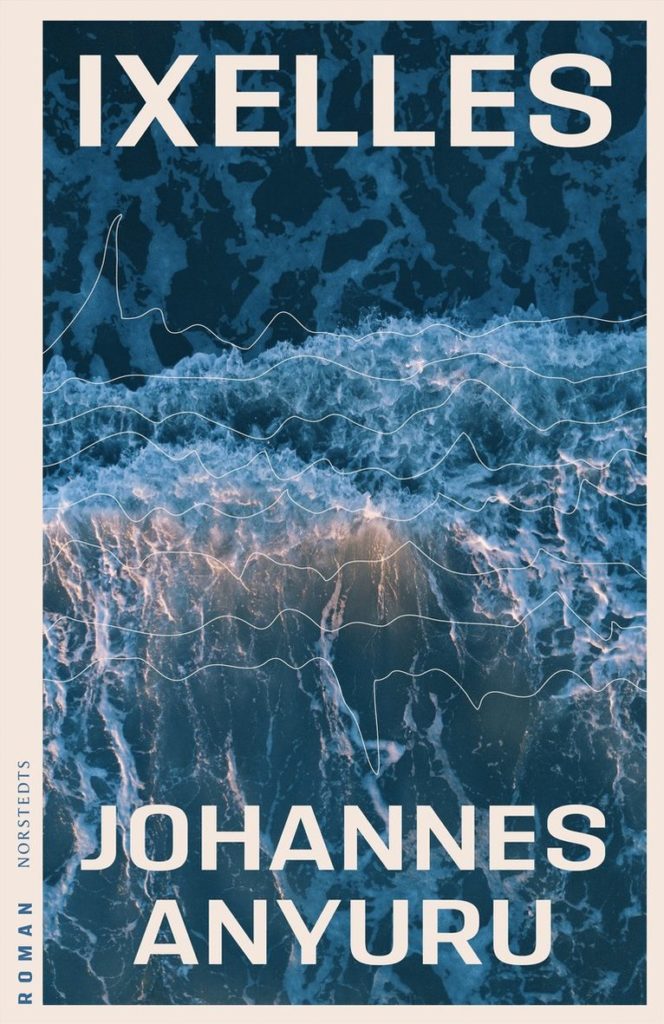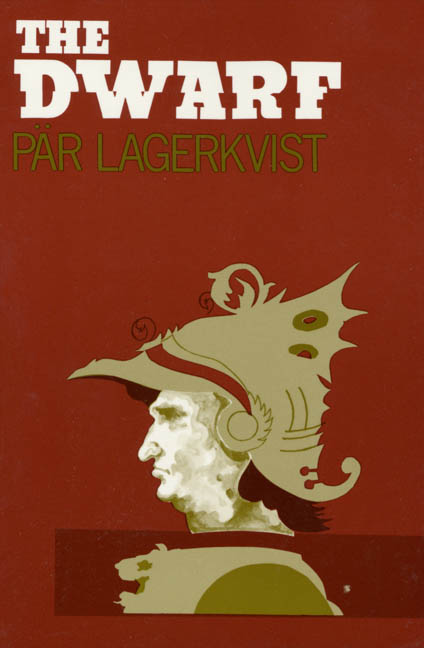Another book club book, this time for the local book club whose April meeting I may or may not have the schedule and mental fortitude to attend. (Not because of the club. Everyone is lovely. Rather, because work is busy.) I don’t keep too much track of assorted literary prizes, but I knew enough to know that De kommer att drunkna i sina mödrars tårar won the August Prize a couple of years ago, so when Johannes Anyuru’s Ixelles was tapped as our next pick I decided to read it. The premise was interesting, and I always prioritize book club picks that are Swedish originals instead of the English best-sellers I already hear too much about.
I still can’t decide if the problem was with the book or with me.
The problem could have been with me because I already spend most of my waking life* reading, writing, dealing with language, processing Swedish; there comes a point where, when I’m reading Swedish fiction, my brain doesn’t know what to do with words anymore. At that point the language triggers a near-synesthetic experience where my nose detects the faintest whiff of brackish water and I feel a salty taste at the back of my tongue, and it’s not anything fun or embodied or anything like being immersed in the language. It’s rather that point in the meal where you’ve had too much and the food no longer tastes good because your body is smashing all kinds of physiological buttons to get you to stop eating.
*I say “waking life” because despite everything, I still dream exclusively in English.
I had those moments a lot during Ixelles. In the book’s defense (since this is a me problem), I don’t think I would have had them if I had been reading the book during the off season. I also don’t think I would have had them if I had slowed down, taken my time, instead of trying to bulldozer my way through the library copy to get it returned in a timely manner.
But maybe the problem was with the book. I skimmed or even skipped substantial portions without losing the thread of the story, which I consider a flaw rather than a strength in a novel. The summary alludes to a tight, dramatic thriller (maybe that’s how we have to market books here in the birthplace of Nordic noir?) but what you end up with is a lot of plodding around: waxing poetic (hah) about the reality of voices, of fictional characters, and a lot of dialogue that doesn’t sound like how people actually talk but like scrapped lines from mildly interesting poetry. Occasionally some plot happens.
Ruth is a single teen mom. Or she was originally a teen mom, but now she’s well into adulthood. Her son, Em, is huge into a tabletop roleplaying game that I assume is Dungeons & Dragons but hey, we could pretend it’s Pathfinder since Anyuru never actually names it. (Would Wizards of the Coast raise a stink all the way in the US? Actually, knowing Wizards of the Coast, I wouldn’t be surprised.) Em’s father, Mio, was murdered before Em was born.
Ruth has a mysterious and cynical PR style job that is essentially a troll and astroturf factory on steroids. The first assignment we see her take, for example, is from an understated luxury men’s fashion line that has unwittingly become associated with a Belgian gang. This is obviously not the branding they’re looking for and so Ruth manages to create an artificial online brouhaha accusing the brand of being racist, which neatly solves the gang association.
The story really gets started when Ruth takes a job on behalf of the local government: her old neighborhood, the projects where she grew up and met Em’s father, is slated to be demolished so a highway can be put in. Residents are obviously not happy about this decision and Ruth has been contracted to kneecap the burgeoning protest. The job brings her back to her old neighborhood and she gets tangled up in a minor bit of intrigue, as the rumor mill informs her that Mio isn’t really dead. Rummaging through the contents of an unconscious boy’s backpack she finds a CD with a recording of someone claiming to be Mio, talking about his life in “the nothing department.” The CDs (because there are several, dozens, hundreds maybe, turning up in backpacks and lockers everywhere) have become something of an underground hit here in the projects and all of the youths are talking about them.
Of course none of this has to play out straightforward and so we get a lot of flashbacks that don’t do anything; the characters are all pretty bland, like even Anyuru himself doesn’t care for them, so the departures from the main story seem pointless. Even Ruth has a distant, uninteresting quality to her that perhaps comes from Anyuru’s decision, as a man in his 40s, to make the protagonist a single mom in her 20s. He has no inner lived experience of that kind and so is unable to imbue her with anything concrete and grounding in that regard.
On the other hand, we get a lot about Ruth at work on her troll job, which seems like it could potentially be pretty interesting. The conceit is like something out of a William Gibson novel (a bit like the inverse of Cayce Pollard out of Pattern Recognition), but in execution it’s not nearly as snappy. She’s decided to create a writer “character” for this assignment and so (sometimes) writes, but mostly banters with her boss about what kind of person this character should be in dialogue that I think Anyuru finds very witty and on the nose but that I thought was just self-indulgent and insufferable. All in all, Ruth’s job is a bit of a snooze fest that keeps us away from the one point of intrigue in the story: the mysterious CDs.
The one notable overlap between author and protagonist is poetry. Ruth is a gifted poet, or supposed to be, and her poetry gets her noticed by the mysterious agency that now employs her. Yet somehow the whole thing feels like a combination of bizarre metaphor (artistry of some kind being a form of acceptance and success for marginalized people in mainstream society) and wishful thinking/self aggrandizing (poetry is such a gift, it points to something unbelievably special about a person, and here is a universe where it is given its proper due). A lot of hay is made about how Ruth’s gift for language and creating characters is what makes her good at her job, which is a funny thing to read in a novel where the characters are all dull and bland.
To get back to the story: the mystery of Mio’s death (and the proliferation of CDs purporting to be recorded by him) is solved for the reader, so to the extent that it’s a murder mystery or thriller, Ixelles delivers on that front. You find out whodunnit and why. I won’t spoil that part of the story here, since it’s a bit of a spoiler-y plot twist, but I will say that I found the resolution banal and deflating.
I think there’s just something with novels by poets that makes me lose my patience. An ear for language is important in a novel, yes, but so is understanding characterization, pacing, and plot, and you don’t get good at those just from writing poetry. The book progresses through weird pointless interludes of excerpts from the mysterious CDs, Em and Ruth playing Dungeons & Dragons (or Pathfinder!), flashbacks with Ruth that don’t establish anything we couldn’t already infer (she was in love with Mio? you don’t say!) or dream sequences from secondary characters. One thread of the flashbacks is with Mio, and that’s the only thread that actually contributes to the story itself.
I also don’t understand the appeal of setting novels in completely foreign countries, which wow when I phrase it like that sounds narrow and small-minded. To be more specific: characters traveling to places, or living as expats or outsiders in foreign places, is a literary well that will never run dry. That’s not what I mean by setting a story in a foreign country.
Anyuru is Swedish and is writing in Swedish; all of the characters in Ixelles are Belgian, whether immigrant or first generation or otherwise. I don’t know that there was anything in the story being better served by being set in Belgium than in Sweden, and a cursory Google search does not indicate that Anyuru has any particular history with or connection to Brussels specifically or Belgium generally. If he was trying to make a sly point about EU politics (Brussels as a stand-in for Europe as a whole, EU parliament, etc.), then it was lost on me. I have a tiny brain. A tiny brain that is overwhelmed by unfamiliar Flemish names.
The comparison that came up for me while I read was Samlade Verk, and on reflection it’s not surprising as both books kind of have a lot in common. The August Prize is perhaps the most obvious and banal of those commonalities, followed by their relative long length. But both books feature single parents with legendary disappeared partners; the authors even cross age and gender lines to write their complete opposite (Sandgren writing an older father and Anyuru writing a younger mother). There are plenty of offhand cultural references, and the stories both hinge on fictional writers (Sandgren creates one for her protagonist to be obsessed with; Ruth creates one as part of her astroturfing assignment in the projects). Both books cast sidelong glances at colonialism (the disappeared mother in Samlade Verk wrote her thesis on the topic; several of the African diaspora characters voice opinions on the topic in Ixelles). Both books jump around in chronology and rely heavily on flashback, or at least a jumbled timeline.
So why did I love Samlade Verk but turn up my nose at Ixelles?
Sandgren got a lot of guff from the neighborhood book club members for being young—or rather, trying too hard (in their opinion) to establish sections of the book as being The Eighties to compensate for not actually having experienced The Eighties. I can’t know how that part of the book hits for readers who remember the 80s, since I’m only a year older than Sandgren myself. But I absolutely recognized a lot of the characters she was putting on page because I’d either been them or I’d gone to school with them. Sandgren writes about the frustrations of studying philosophy in the way only a fellow philosophy student can really manage, which gave her characters depth and had me invested in the story, even when they were flawed and crappy people.
Not so in Ixelles, and here again the problem might be with me because I didn’t grow up in the projects of Brussels (or Araby in Växjö, for that matter). I didn’t have a wealth of experience I could use to project on to characters and fill in the blanks, which I’m sure I did with Samlade Verk. But I’d argue that in Ixelles there is still a lack of interiority based in lived experience; the best we get is other people telling us how we should feel about characters or what their primary traits are. Ruth’s boss explains to us that Ruth a gifted poet and that’s why he offered her a job. A stranger on the bus tells Em that Mio bought everyone on the block PlayStations for Christmas one year. Mio tells us—through Ruth’s recollections—that Ruth’s best friend Harsha is a busybody but also the beloved neighborhood big sister. But Ruth herself never agonizes over her writing, Mio’s generosity stays off the page even in flashbacks, and in all of her interactions with Ruth, Harsha is kind of cold and distant and awkward.
Despite its heft, Samlade Verk had a red thread running through it, a sharp focus and with clearly delineated branches: the mother who just left, and the husband and children she left behind. The fact that it runs for 600? 700? pages speaks more to the depth that Sandgren explores in her characters rather than the breadth of topics, and a lot of that is due to exactly that interiority. Ixelles, on the other hand, eschews character depth for a breadth of “I think this is an important topic” or “I think this is a cool idea.” Instead of being one cohesive book, Ixelles becomes two or three or five, all glued together into a clunky whole that is a disservice to all of the potential books it could have been.



